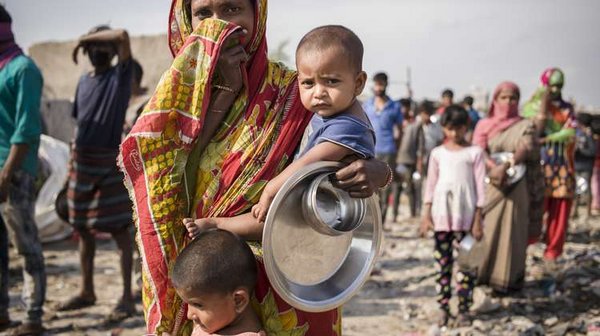- Share this article
- Subscribe to our newsletter
More support needed for poorest nations
The child aid organisation terre des hommes and the humanitarian aid organisation Welthungerhilfe presented this year’s Kompass zur Wirklichkeit der deutschen Entwicklungspolitik (Compass 2021: Report on the reality of German development policy) on 19 May 2021. The report gives a critical analysis of German development policy, with special attention placed on the demands the UN sustainability agenda adopted in 2015 is making on German policy.
Both organisations welcome the fact that the Federal Government immediately increased funding to tackle the coronavirus crisis in the countries of the Global South. At the same time, however, they note that the need for humanitarian aid and development cooperation will continue to rise in coming years in the face of rising hunger statistics, threatening starvation, growing poverty and a dramatic intensification of the climate and environmental crisis.
Matthias Mogge, Secretary General of Welthungerhilfe, explains that although development cooperation aid has increased internationally, support for the poorest nations has declined. Germany is now the second-largest development cooperation donor after the USA. Mogge points out that this gives Germany a powerful voice, which needs to be used now.
Terre des hommes and Welthungerhilfe call for combating poverty and efforts to overcome the consequences of the coronavirus pandemic to be the core task for development policy in the new legislative period. Attention needs to particularly focus on the people in the poorest countries.
Real change needed in the food system
Climate change, wars, and economic shocks resulting from the coronavirus pandemic have brought severe setbacks in the struggle against hunger and poverty. The coronavirus pandemic in particular has shown dramatically how important social protection systems, investment in health and food security are. Mogge notes that the COVID 19-related restrictions often complicate access to starving people.
He criticises the way that food is produced and consumed and calls for a change in the system. “The current food system is not suitable for combating hunger and protecting the planet,” he states. “If we continue as we are doing now, hunger will not be defeated by 2030.” One opportunity for initiating real change in the food system is the UN Food Systems Summit. This Is where the lines for a new policy could be drawn.
Mogge argues that a real system change requires greater policy coherence. There must be closer cooperation between food policy, agricultural policy, energy policy and health policy, among others. Only then is system change possible. The food summit can identify approaches for a solution, after which there should be regular review conferences.
Another argument for a system change are the costs caused by the current food system, which are often overlooked. These include the costs of wasting water and food, or of restricted access to land for small-scale farmers.
Dramatic setback to achievements in children’s rights
Sustainable development and child rights are inextricably connected, as Birte Kötter, executive spokeswoman for terre des hommes, explains. Women and children are particularly affected by the setbacks in combating hunger and poverty, and in several regions are again threatened by starvation. Children have to work and cannot go to school; an increasing number of children live on the streets.
“At the moment we are seeing how the coronavirus pandemic is dramatically rolling back decades of advances in children’s rights. Millions of children are suffering from hunger, are being driven onto the streets or are forced to work or beg to keep their families alive. Young people in our projects are telling us that they have been unable to go to school for over a year, and see no future for themselves,” Kötter explains.
“This is why we urgently need humanitarian aid, such as vaccine and oxygen supplies, but we also need to share the results of scientific research and technologies for fighting the pandemic. These cannot be reserved to the rich countries, but in the interests of humanity and in terms of the future of children must be seen as a public good.” Kötter calls for a waiver of patent protection for the duration of the pandemic.
Ines Lechner, Rural 21
Read more and download Kompass 2021 (in German) at Welthungerhilfe website





Add a comment
Be the First to Comment